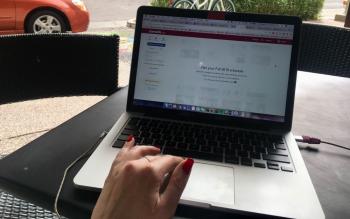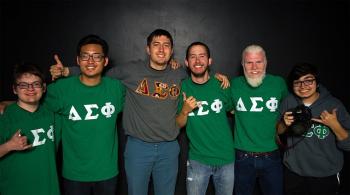Tons of companies started out in collegiate dorm rooms on budgets of nothing. And look at them now -- Facebook, Google, Microsoft -- powerhouses of the tech industry. All it takes is a little (or a lot) of ingenuity, hard work, ambition, and perhaps eventually, a bit of venture capital. These 10 startups were built by college students and if you haven’t heard of them yet, keep a look out.
Geopipe
Geopipe creates digital models of the real world, built by algorithms, for architecture, real estate, simulations and more. Created by Christopher Mitchell from NYU and Thomas Dickerson of Brown University, the two partnered together in a passion for applying algorithmic techniques to process and model data in the real world. The idea came when Mitchell was trying to build New York City in Minecraft at a 1:1 scale, and Dickerson was creating well-known buildings out of virtual LEGOs. Now, the application allows one to explore, render, and even modify detailed, immersive copies of the real world.
Coursicle
Never sit on a class’ waitlist again. Coursicle notifies you when a class you're interested in has an available seat, along with other features like arranging your schedule, checking what classes your friends are taking, and letting you browse course catalogs. It was developed by Joe Puccio when he struggled to register for his first semester of classes at the University of North Carolina at Chapel Hill during the summer of 2012. "When I was an incoming freshman in college I spent like seven hours planning my schedule," Puccio told The State Press. "When it actually came time to register, I only got into one of the five classes I needed to take." Puccio worked with a friend to design the website and accompanying mobile app, and it’s now making its way to colleges across the country.
Ravle
Watch amazing films and documentaries of travel adventures, and then get the exact coordinates and spots the filmmaker visited to capture the movie in a convenient itinerary. Ravle bills itself as a travel company and filmmaker collective transforming world class photography and videography into comprehensive travel guides. The startup is a product of Syracuse University students students Tay Lotte and Kevin Rieck, and after watching a video or two of the featured adventures, you can’t help but consider dropping $10 to see where they went.
Virgo
Record your colonoscopy! Virgo is cloud-based video recording for gastroenterologists. Why does it matter? Before Virgo, gastroenterologists had to carry around unsecure DVDs and external hard drives to record their procedures. As a result, the vast majority of colonoscopies went unrecorded, with only a few still images saved per case. Today, Virgo provides clinical videos of the procedure that are powerful tools for research, training, quality improvement, and patient education. CEO Matt Schwartz and Vanderbilt University grad says that over time, he hopes to add more automation to help the with the diagnosis.
RoBotany
Robotany is transforming agriculture by creating smart indoor farms that deliver perfect, pure produce no matter the season or location. Austin Webb, Austin Lawrence, Daniel Seim and Brac Webb founded the indoor-vertical-farming company while attending Carnegie Mellon University's Tepper School of Business. “We're techies, but we have green thumbs,” said Webb to TribLive. Seim, just as passionate about combining tech and agriculture, sees the future as a 20,000-square-foot farm with robots scaling racks up to 25 feet high.
Drone MVP
When the University of Southern California’s Harrison Sheingberg and Louis Van Hove learned that the commercial drone market was valued at $2 billion dollars, they went to work designing a service that would meet the market’s needs. Drone MVP was born to connect a large pool of self-employed drone pilots with content seekers, and ultimately developed into an agency complete with an in-house creative team delivering the full package.
Syllabye
The electronic syllabus is “your semester’s best friend.” Tired of other scheduling methods and endless syllabi, Lucas DiPietrantonio and Jeremy Werden created a platform while attending University of North Carolina at Chapel Hill to simplify the semester. It allows you to select your school, add your schedule, sync all of your calendars, get notifications when assignments are due and more.
Trippie
Trippie is revolutionizing the airport experience with its new interactive airport maps that aim to reshape the way travelers think while waiting for their flights. The app also provides some of the most accurate TSA wait times and allows you to track travel stats, learning users' tastes and making suggestions on where to eat, shop and drink. The app’s founder, Colgate University’s former Division 1 basketball player Ryan Diew, participated in a thought incubator at the university that led him to pitch the idea in a Shark Tank-like event at Colgate. Diew won first place and $5,000, allowing him to continue developing the app which is in beta now.
SwineTech
SwineTech might be exactly what it sounds like -- technology working on behalf of pigs. The app is a solution that reduces the number of piglets that die from disease, starvation, and crushing, which costs the pork industry more than $8.9 billion per year. University of Iowa founders Abraham Espinoza and Matthew Rooda developed its patented technology, SmartGuard, which uses “advanced acoustic engineering, proprietary algorithms, and machine learning to filter and detect when a piglet is getting crushed.”
Sweetbud
This one answers the “why didn’t I think of that?” poll. University of California - Irvine students Sara Du and Simon Zirui Guo designed Sweetbud, a coffee lid that will make your coffee sweet without the sugar. How? Sweetbud allows you to taste the sweetness without taking in any sugar through non-invasive electrical currents and pure silver in the lid, which sends signals to your brain that you’re drinking something sweet. The device even comes with a mobile app allowing you to calibrate the lid to find a comfortable intensity of sweetness.
Gaia
Developed to empower parents of children with autism with an early notification system for meltdowns, Gaia helps prevent, mitigate and decrease the frequency of the intense responses autistic children get from overwhelming situations. Rochester Institute of Technology’s Brent Chase designed the device and plans to continue creating smart wearable technology that will make waves in empowering the autism spectrum disorder (ASD) community.






